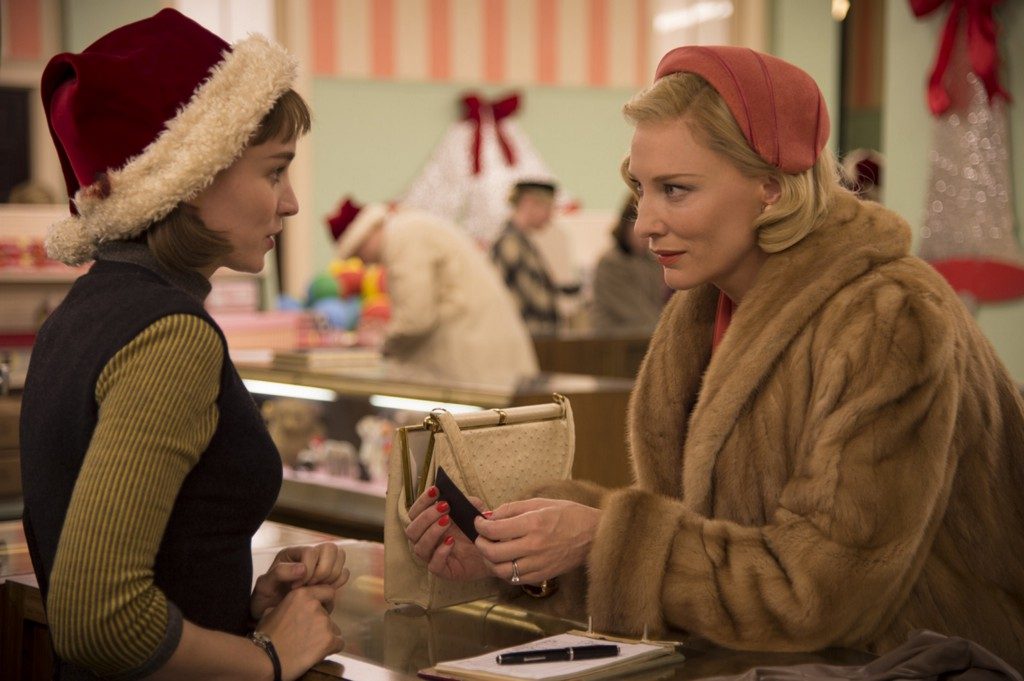In a few short weeks, the Supreme Court of the United States will decide on the issue of gay marriage once and for all. Over here at the Cannes Film Festival, “Carol,” based on Patricia Highsmith’s “The Price of Salt,” premiered to a widely enthusiastic audience last evening.
The film, set in 1952 New York City, tells the story of the love between two women. Standing in for Highsmith, Therese (played by a never better Rooney Mara) is the observer of the world. Carol is played by the always good (and by good, I mean super-terrific) Cate Blanchett. The women are opposites in many ways. Blanchett is smoldering and looks like she might explode at any minute, while Rooney is young, restrained and unclear of her place in the world.
The film is set in post World War II America. It is a frayed country. Women are being forced back into traditional roles, and McCarthyism and its attendant witch hunts have begun to mar the soul of the country. And let’s not forget that the FBI was run by a closeted man: J. Edgar Hoover.
“Carol” tells the story of forbidden love during a time when you could be jailed for being gay. (And let’s remember, there are still many countries where you can still be jailed, or even killed, for being gay.) Today, Carol and Therese’s relationship wouldn’t raise eyebrows, but not too long ago, it was a whole different story.
Carol is extricating herself from a loveless marriage to a bully, Harge (played to the letter by Kyle Chandler). He just doesn’t understand why she can’t love him. He is unable to process it, which leads to him being deeply fearful of himself, but especially of the woman who has rejected him. Carol is a lesbian, though I don’t think we ever hear the word once in the film. What happens between her and Therese is not the first time she has been with women during her marriage. I assume she got married in the first place because, as an upper-middle-class woman, that’s what she was supposed to do. But as you can imagine, the marriage was doomed.
What’s so extraordinary about this film is that it is not a film about shame. It is a film about love. Carol refuses to be ashamed about who she is and who she loves. Thier courtship begins in a department store through stolen glances. Therese is taken with everything about Carol. You can almost see Rooney Mara holding her breath, not knowing how to handle these feelings that have rushed into every sense of her being.
The movie builds their relationship slowly (and the one fault I can find in the film is that it is too slow at times, particularly in the beginning). It keeps drawing us in (like a Highsmith novel, and kudos to writer Phyllis Nagy), adding real tension to what is going on in the dissolution of Carol’s marriage ,especially regarding the custody of her 4-year-old daughter.
Therese is ready to give up everything to be with Carol. They take to the road very carefully to be discreet about two women traveling alone together. On the road trip, they are drawn to each other in a beautifully choreographed and very satisfying love scene unlike any I’ve seen in mainstream films, especially with A-list movie stars.
What’s so special about Carol is that this film puts women’s lives on display in a way I had not experienced before. This is the type of movie we have been desperate to see: Real women struggling and living real lives. Women who make us question the role of society in multiple ways. That’s one of the things that is so satisfying about the film.
Mara, who moved us as “The Girl with the Dragon Tattoo,” takes her acting to a whole new level as the budding photographer who allows herself to experience this emotional rollercoaster with Carol. This is not a movie about lesbianism in the ’50s. We see very little indication of any gay life of that era, aside from a pair of butches staring at Therese as she buys a record.
The movie takes us inside Carol’s claustrophobic life. At times, she seems to be one cigarette away from losing her mind, trying to hold it together in the stifling world she occupies. But she must keep moving forward in whatever way she can because of her daughter. Carol is powerless in many ways — she’s powerless to deny who she is, and that gives her husband power over her. From what I can tell, she has no assets, so she is forced, time and again, to return to Harge and their false life. There is a super-sad scene where, at dinner (while desperately waiting for her child to be brought back to her), she talks about how her psychotherapist has helped her and acts like everything is OK.
But it’s not, and she can’t stay in the marriage. In what might be the most political and powerful scene in the film, Carol, in front of all male lawyers deciding on her fate and the fate of her daughter, says that she refuses to apologize or regret anything. She gives up primary custody to save her daughter from being dragged through the courts. She uses what power she has, and it’s the power of motherhood. Carol the firebrand is the pre-cursor to Edith Windsor.
Last year at the Oscars, not a single movie with a female protagonist was nominated for best picture. In this film, we’ve got two. Unless I am totally bonkers, this film will be included in the mix next year after it opens on December 19.






